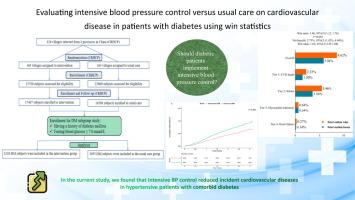Evaluating intensive blood pressure control versus usual care on cardiovascular disease in patients with diabetes using win statistics: a subgroup analysis of a cluster randomized trial
IF 13
1区 综合性期刊
Q1 MULTIDISCIPLINARY SCIENCES
引用次数: 0
Abstract
Introduction
Elevated arterial pressure constitutes a significant controllable risk element associated with detrimental outcomes in cardiovascular health. In comparison to standard blood pressure (BP) control (target level: <140/90 mmHg), intensive blood pressure management aimed at achieving lower target values has demonstrated superior efficacy in diminishing the incidence of negative cardiovascular occurrences. However, there is still controversy over intensifying blood pressure control in diabetic individuals.Objectives
Assessing the viability and efficacy of stringent blood pressure regulation in diabetic patients with hypertension.Methods
A post hoc analysis of disaggregated data from 33,995 hypertensive patients enrolled in the China Rural Hypertension Control Project (CRHCP) trial was performed. Outcomes were evaluated using the unmatched win ratio (win ratio >1.00 indicating better outcomes) and compared with the Cox model. The principal endpoint was the occurrence of major adverse cardiovascular events (MACE), encompassing myocardial infarction, stroke, hospitalization due to heart failure, or cardiovascular mortality, over a three-year follow-up period.Results
The analysis included 6303 adults with hypertension and diabetes (mean age 63.2 years; 2172 men). At the three-year mark, the average systolic/diastolic blood pressure measured 126.7/72.5 mmHg in the intensive blood pressure control cohort, in contrast to 147.7/80.6 mmHg in the standard care group. Intensive blood pressure management lowered the yearly incidence of major adverse cardiovascular events (MACE, 2.28 % compared to 3.28 %; HR: 1.45; 95 % CI: 1.20–1.72; P < 0.001), strokes (HR: 1.47; 95 % CI: 1.20–1.82; P = 0.015), and deaths from cardiovascular causes (HR: 1.49; 95 % CI: 1.04–2.13; P = 0.029). Symptomatic hypotension rates were similar (0.77 % vs. 0.52 %; P = 0.231). Hierarchical analysis showed more wins (31021 [8.62 %]) than losses (23985 [5.84 %]), with a win ratio of 1.46 (95 % CI: 1.22–1.76; P < 0.001). After 36 months, the mean fasting blood glucose (FBG) in the group with intensified blood pressure control was modestly elevated (9.09 mmol/L compared to 8.51 mmol/L; difference: 0.58 mmol/L; 95 % CI: 0.34–0.81; P < 0.001).Conclusion
Intensive BP controlled by non-physician community healthcare providers reduced incident cardiovascular diseases in hypertensive patients with comorbid diabetes but was associated with an elevation of FBG.Registration: The trial is listed on ClinicalTrials.gov under the identifier NCT03527719.

使用win统计评估强化血压控制与常规护理对糖尿病患者心血管疾病的影响:一项聚类随机试验的亚组分析
动脉压升高是与心血管健康有害结果相关的重要可控风险因素。与标准血压(BP)控制(目标水平:<;140/90 mmHg)相比,旨在达到较低目标值的强化血压管理在减少心血管不良事件发生率方面显示出更优越的疗效。然而,对糖尿病患者加强血压控制仍存在争议。目的评价糖尿病合并高血压患者严格血压调节的可行性和疗效。方法对参加中国农村高血压控制项目(CRHCP)试验的33995例高血压患者的分类数据进行事后分析。采用不匹配胜率(胜率>;1.00表示更好的结果)评估结果,并与Cox模型进行比较。主要终点是主要不良心血管事件(MACE)的发生,包括心肌梗死、中风、因心力衰竭住院或心血管死亡,随访时间为三年。结果纳入6303例高血压合并糖尿病成人患者(平均年龄63.2 岁;男性2172例)。在三年的时间里,强化血压控制组的平均收缩压/舒张压为126.7/72.5 mmHg,而标准治疗组的平均收缩压/舒张压为147.7/80.6 mmHg。密集的血压管理年度主要不良心血管事件发生率降低(狼牙棒,2.28 %相比3.28 %;人力资源:1.45;95 % CI: 1.20 - -1.72; P & lt; 0.001),中风(人力资源:1.47;95 % CI: 1.20 - -1.82; P = 0.015),心血管疾病的死亡和(人力资源:1.49;95 % CI: 1.04 - -2.13; P = 0.029)。症状性低血压发生率相似(0.77 % vs. 0.52 %;P = 0.231)。层次分析显示,胜率(31021[8.62 %])大于败率(23985[5.84 %]),胜率为1.46(95 % CI: 1.22-1.76; P <; 0.001)。36 个月后,加强血压控制组的平均空腹血糖(FBG)适度升高(9.09 mmol/L与8.51 mmol/L相比;差异:0.58 mmol/L; 95 % CI: 0.34-0.81; P <; 0.001)。结论非医师社区卫生保健提供者控制的强化血压降低了合并糖尿病的高血压患者心血管疾病的发生率,但与空腹血糖升高有关。注册:该试验在ClinicalTrials.gov上列出,标识符为NCT03527719。
本文章由计算机程序翻译,如有差异,请以英文原文为准。
求助全文
约1分钟内获得全文
求助全文
来源期刊

Journal of Advanced Research
Multidisciplinary-Multidisciplinary
CiteScore
21.60
自引率
0.90%
发文量
280
审稿时长
12 weeks
期刊介绍:
Journal of Advanced Research (J. Adv. Res.) is an applied/natural sciences, peer-reviewed journal that focuses on interdisciplinary research. The journal aims to contribute to applied research and knowledge worldwide through the publication of original and high-quality research articles in the fields of Medicine, Pharmaceutical Sciences, Dentistry, Physical Therapy, Veterinary Medicine, and Basic and Biological Sciences.
The following abstracting and indexing services cover the Journal of Advanced Research: PubMed/Medline, Essential Science Indicators, Web of Science, Scopus, PubMed Central, PubMed, Science Citation Index Expanded, Directory of Open Access Journals (DOAJ), and INSPEC.
 求助内容:
求助内容: 应助结果提醒方式:
应助结果提醒方式:


